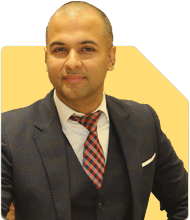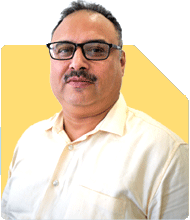Harsh Bharwani | Answer |Ask -Follow
Entrepreneurship Expert - Answered on Feb 19, 2024
As CEO and managing director, he leads the international business and employability initiatives at the computer networking institute, Jetking Infotrain Limited.
After graduating from Delhi University, Bharwani joined the family business in 2010 and set up operations in the US and Vietnam.
He has trained over three lakh students in employability, confidence and key life skills.... more

Hello Harsh, I have 15 years of work experience in cutting edge internet Technology companies. I am planning to hang my boots and do a start-up in the same domain. Could you please let me know the most importatnt things to look out for i.e. things to do and not to do. This will help of great help. Thank you.
Things you can do:
First, it’s important to understand the needs and issues facing your target market, competitors, and potential customers.
Clearly explain your startup's uniqueness and how it resolves a problem or fulfills a need better than existing solutions.
Develop a detailed plan about your business, goals, target market, marketing strategy, revenue model, financial projections, etc.
Bring talented individuals on your board who share valuable startup vision and complement your skills. So, don't hesitate to surround yourself with amazing people!
Give top priority to deliver exceptional customer service and build strong relationships with your effective customers.
A great way to start is by developing a minimum viable product (MVP) and gathering proper feedback from early adopters because It will help you to refine and improve your offering.
For more interaction with customers, develop a marketing strategy to increase awareness of your startup.
Build some meaningful relationships with potential investors, mentors, industry experts, and fellow entrepreneurs. Who can offer valuable support and guidance to you?
To be flexible and ready to adapt to feedback and changing circumstances based on market trends.
Prioritizing your physical and mental well-being is key to long-term success as an entrepreneur.
Things Not to Do:
Do not ignore daily industry trends and changes in consumer behavior to remain competitive.
Don't underestimate the costs of your budget and expenses, and factor in unforeseen costs.
Losing focus on your core business objectives and getting distracted by shiny new opportunities
Not ensuring whether your startup is compliant with all relevant laws and regulations to avoid legal problems in the future.
To avoid fatigue, do not pace yourself and do not prioritize tasks.
Not analyzing competitors thoroughly and ignoring their strengths and weaknesses.
Being hesitant in taking feedback from customers, mentors, and team members and not using it to improve your product or service
Not taking the time to develop a high-quality product or service and failing to meet customer needs and provide value
Not investing in building a strong brand identity that resonates with your target audience.
Not accepting failure as a learning opportunity and not using failure as motivation to persevere and improve.
As you embark on this new journey, it is essential to leverage your expertise to identify unique opportunities and develop innovative solutions that address critical challenges in the Internet technology sector. Best wishes on this exciting entrepreneurial journey!
You may like to see similar questions and answers below
Amit Grover | Answer |Ask -Follow
Answered on Feb 08, 2012
Amit Grover | Answer |Ask -Follow
Answered on Feb 08, 2012
Baqar Iftikhar Naqvi |114 Answers |Ask -Follow
Start-up Mentor - Answered on Sep 16, 2023
Krishna Kumar | Answer |Ask -Follow
Workplace Expert - Answered on Feb 23, 2024
Dr Ganesh Natarajan | Answer |Ask -Follow
Career Expert - Answered on May 27, 2025
Radheshyam Zanwar |5846 Answers |Ask -Follow
MHT-CET, IIT-JEE, NEET-UG Expert - Answered on Jul 26, 2025
Radheshyam Zanwar |5846 Answers |Ask -Follow
MHT-CET, IIT-JEE, NEET-UG Expert - Answered on Jul 26, 2025
Radheshyam Zanwar |5846 Answers |Ask -Follow
MHT-CET, IIT-JEE, NEET-UG Expert - Answered on Jul 26, 2025
Radheshyam Zanwar |5846 Answers |Ask -Follow
MHT-CET, IIT-JEE, NEET-UG Expert - Answered on Jul 26, 2025
Radheshyam Zanwar |5846 Answers |Ask -Follow
MHT-CET, IIT-JEE, NEET-UG Expert - Answered on Jul 26, 2025
Radheshyam Zanwar |5846 Answers |Ask -Follow
MHT-CET, IIT-JEE, NEET-UG Expert - Answered on Jul 26, 2025
Radheshyam Zanwar |5846 Answers |Ask -Follow
MHT-CET, IIT-JEE, NEET-UG Expert - Answered on Jul 26, 2025
Radheshyam Zanwar |5846 Answers |Ask -Follow
MHT-CET, IIT-JEE, NEET-UG Expert - Answered on Jul 26, 2025
Radheshyam Zanwar |5846 Answers |Ask -Follow
MHT-CET, IIT-JEE, NEET-UG Expert - Answered on Jul 26, 2025
Radheshyam Zanwar |5846 Answers |Ask -Follow
MHT-CET, IIT-JEE, NEET-UG Expert - Answered on Jul 26, 2025























